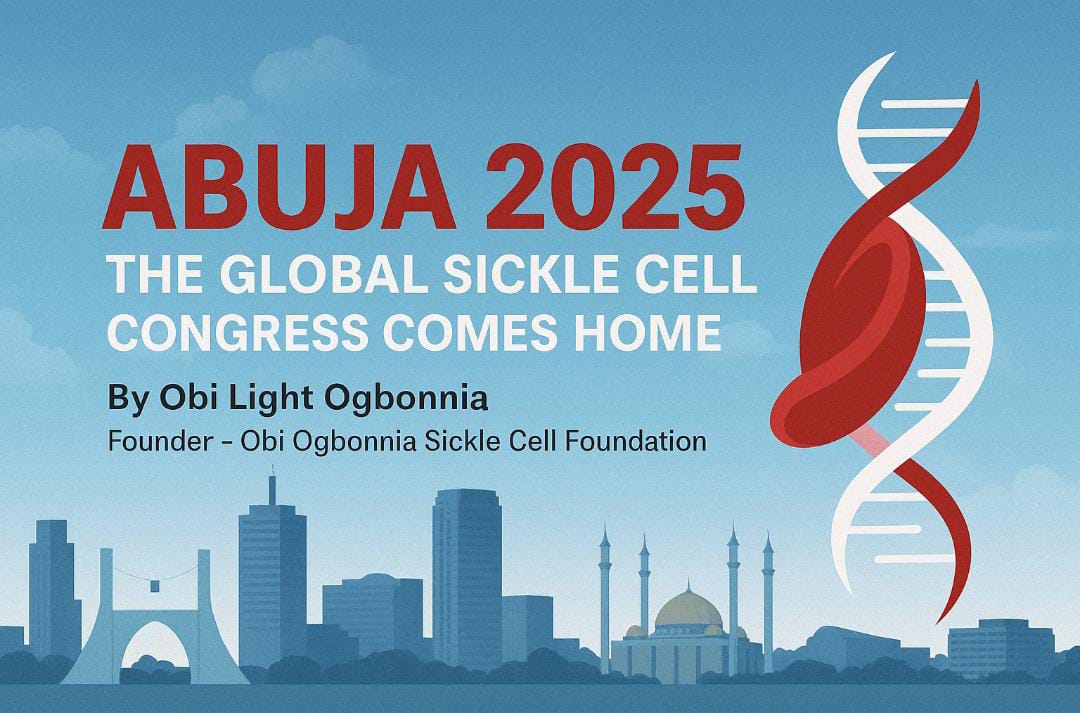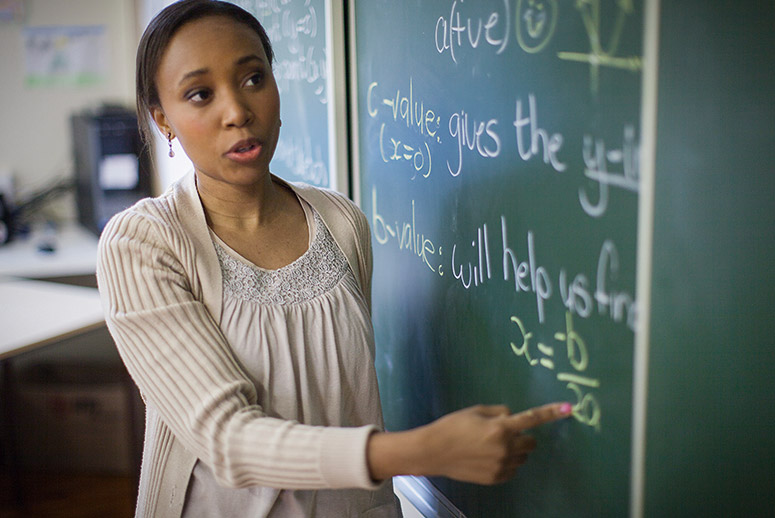Education
Abuja 2025: The Global Sickle Cell Congress Comes Home

By Obi Light Ogbonnia
When the 5th Global Congress on Sickle Cell Disease convenes in Abuja in June 2025, it won’t just be another event in a long line of medical conferences, it will be a homecoming. For the first time, the world will gather at the very heart of the sickle cell crisis: Nigeria, the global epicenter, where over 150,000 babies are born annually with the condition.
For decades, sickle cell discourse has largely been shaped in the halls of Western research institutions and international conference centers.
Cities like Paris, Atlanta, London, and Accra have hosted past editions, laying foundations for research collaboration, clinical trials, and drug development. Yet none of these cities carry the raw urgency, the lived reality, and the generational impact of sickle cell disorder quite like Abuja does.In Nigeria, sickle cell isn’t just a statistic, it is a daily struggle etched into families, communities, and over four million warriors fighting for survival, dignity, and access to care.
A Turning Point for the Warriors
For Nigeria’s sickle cell warriors, Abuja 2025 carries profound expectations. Many are hoping for more than discussions, they are demanding action. They seek the latest in gene therapy and emerging treatments, but they also need policies that make these breakthroughs accessible. They want to be recognized not just as patients, but as partners in designing their future.
We want to move beyond awareness to empowerment, beyond diagnosis to solutions, beyond pity to partnerships.
Healthcare Systems Must Rise
The Congress is also a moment of truth for Nigeria’s healthcare system. Despite being the sickle cell capital of the world, the country still struggles with basic infrastructure, nationwide newborn screening, early intervention, and accessible care remain far from reach.
Will Abuja 2025 be remembered for grand speeches and panels, or for concrete policy shifts, investment in care centers, and life-changing public health decisions?
From Civil Society to Global Solidarity
This is also a call to action for NGOs, foundations, and global development agencies. From the Obi Ogbonnia Sickle Cell Foundation to international players, Abuja offers a platform to forge scalable models of support, affordable insurance coverage, comprehensive education, mental health care, and grassroots outreach.
Now is the time to go from pilot projects to long-term partnerships that transform lives in underserved communities.
Reflecting on the Past, Building the Future
Past congresses made notable strides. Paris fostered cross-border ideas. Atlanta opened dialogue on health equity. London spotlighted funding and innovation. Accra brought a shift toward African-led solutions. But Abuja must be different, it must be decisive.
If the past was about raising awareness, Abuja 2025 must be about delivering change in the very land where the need is greatest.
The Legacy of the Global Congress
Since its inception, the Global Congress on Sickle Cell Disease has helped move the disorder out of the shadows. It has influenced global health conversations, spurred research, and laid the groundwork for policy advocacy.
Yet, without implementation in countries like Nigeria where the highest burden exists, those milestones risk remaining aspirational.
A Time to Choose Differently
Abuja 2025 is not just another conference; it is a test of commitment, solidarity, and vision. For governments, it is a call to political courage. For the global community, it is a call to equity. For sickle cell warriors, it is a chance to reclaim their narrative.
Sickle cell disorder may be genetic, but how we treat it as a society and as a global community, is a choice.
Let Abuja 2025 be the moment we chose differently.
Obi Light Ogbonnia is a 51-year-old sickle cell warrior, founder of the Obi Ogbonnia Sickle Cell Foundation and advocate for equitable healthcare access in Nigeria. He writes regularly on public health, policy and empowerment for vulnerable communities.
Education
UNICAL VC Promises to Resolve Dentistry Students’ Crisis

From Ene Asuquo, Calabar
The Vice Chancellor of the University of Calabar, Prof. Florence Obi has promised that she would do everything humanly possible to ensure that the ongoing crisis in the institution’s Department of Dentistry, is resolved.
Prof.
Obi made the promise in Calabar during a press briefing, stressing that she will resolve the crisis before leaving office.She explained that the problem predates her administration, and pledged to intensify efforts to rectify the crisis.
She added that the crisis was as a result of the Medical and Dental Council of Nigeria (MDCN)’s refusal to induct 2016 Dentistry students of the institution.She also debunked claims circulating on social media that the institution’s Dentistry programme has lost its accreditation, describing the reports as “misinformation and distortion of facts,” clarifying that the programme remains fully accredited and no students have been directed to transfer to other universities.
“At no point did the University ask Dentistry students to seek transfers to other institutions, nor were they advised to ‘go and learn a trade’ as falsely alleged online,” the VC stated.
“I will feel very bad if I leave without solving this problem and the students are left hanging without knowing their fate. I won’t be fulfilled,” she said.
She reaffirmed the University’s commitment to ensuring all Dentistry students graduate and are duly licensed as dental surgeons.
She noted that the Dentistry programme commenced in the 2013/2014 academic session, and in November 2019, the University secured pre-clinical accreditation from the MDCN and full clinical accreditation was subsequently granted in December 2022.
The VC added that the university’s synergy and partnership with the Minister of Education and the Tertiary Education Trust Fund (TETFund) to upgrade its facilities.
“All we asked for is time to engage with other institutions, update the Medical and Dental Council of Nigeria (MDCN), and follow through on due processes,” she noted.
Speaking further, Obi said that some of the affected students demanded to be transferred to the Department of Medicine and Surgery but said it was not the solution as the department was already saturated.
She urged the affected students to remain calm, noting that the university was doing everything possible to resolve the issues before the end of her tenure.
Education
NUT Reaffirms Commitment to Teachers’ Professional Development in Kwara

From Abdullahi Abubakar, Ilorin
The Nigeria Union of Teachers (NUT), Kwara State Wing has restated its commitment to strengthening the professional growth of teachers across the State, to enhance the quality of education delivered in public schools. Speaking at the opening of a three-day capacity-building workshop in Ilorin, the State Chairman of the Union, Comrade Yusuf Wahab Agboola, noted that continuous training of teachers remains a vital component of educational reform and improved classroom delivery.
The training, organised in collaboration with the NUT National Secretariat, is targeted at selected teachers and focuses on the “Study Circle Conveners’ Model”—a grassroots strategy for enhancing peer-to-peer learning and participatory leadership within the education sector.
Comrade Agboola explained that the workshop aims to equip teachers with practical skills in collaborative learning, peer engagement, and innovative teaching practices. He expressed optimism that the training would promote professional bonding among teachers and foster collective solutions to challenges facing the education sector.Also speaking at the event, the National Coordinator of the NUT Study Circle Project, Comrade Solomon Igbelowowa, traced the initiative’s roots to 1985 when it was introduced in Nigeria by the Swedish Teachers Association, having recorded success in Sweden and other parts of the world. He commended the Nigerian Union of Teachers for sustaining the project over the years and urged participants to engage fully and make the most of the training opportunity.
The workshop was officially declared open by the National President of the NUT, Audu Amba, who was represented by the 3rd National Vice President, Bashir Oyewo.
He encouraged teachers to approach the sessions with dedication and punctuality.
Education
JAMB Sets 150 Cut-off Mark for University Admissions

By Tony Obiechina Abuja
The Joint Admissions and Matriculation Board (JAMB) has fixed 150 as the minimum cut-off mark for admission into Nigerian universities for the 2025/2026 academic session.
The decision was reached on Tuesday during the 2025 Policy Meeting on Admissions, held at the Bola Ahmed Tinubu International Conference Centre in Abuja, with stakeholders from various tertiary institutions in attendance.
According to JAMB, 140 was approved as the minimum score for colleges of nursing sciences, while polytechnics, colleges of education, and colleges of agriculture will admit candidates with a minimum score of 100.
“The minimum admissible scores for admissions for the next academic session have been fixed at 150 for universities, 100 for polytechnics, 100 for colleges of education, and 140 for colleges of nursing sciences by the stakeholders (Heads of Tertiary Institutions),” JAMB announced via its official X account.















